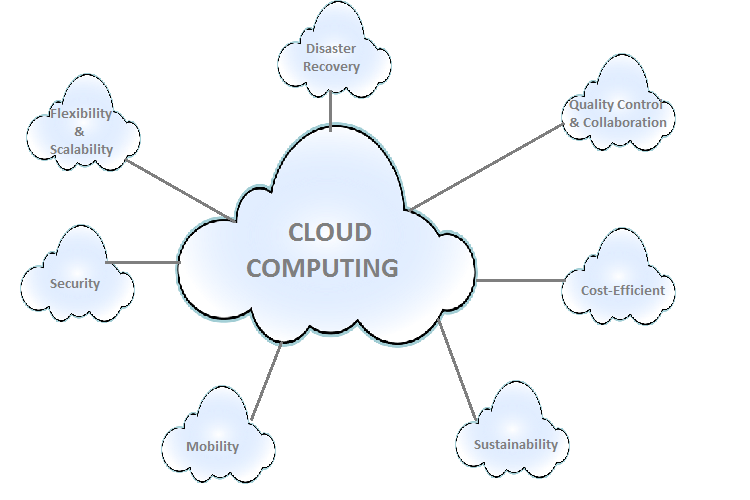
12
Mar, 2021ADVANTAGES OF CLOUD COMPUTING TECHNOLOGY
Cloud computing technology has been around for more than two decades now, still, many businesses have not focused on adopting it. A swift implementation process of cloud technology is ongoing, so the global cloud service market is expected to reach $623.3 billion by the year 2023. According to IDC, the top sectors that have a plan to spend the most in terms of investing into cloud computing services are professional services ($18.1 B), manufacturing ($19.7 B), and banking ($16.7 B). There will be a huge requirement Cloud computing offers elevated security and stability, helps decrease overall costs, and provides organizations with higher flexibility.
What Is Cloud Computing?
Cloud Computing technology is a way of computing where both services and software are delivered virtually utilizing a private or public network. The central focus of the cloud is to provide flexible resources at affordable rates to enhance the overall user experience. In simple terms, it is known as the distribution of computing resources on-demand via the internet.
Cloud computing has a very similar operational base to other email clients, allowing users to completely access all the different files and features of the system without the need to keep all the large data on their physical computer systems. Technically, all the regular systems used by large populations for general work and entertainment like Gmail. Google Drive, Facebook, Instagram Etc, use Cloud technology. In these cloud services, users send their personal data to a cloud-based server that stores the data for usage whenever that user needs it. This same process is even more valuable for businesses, consisting of huge racks of data that need to be accessed over a safe and secure, online network connection service that is available 24/7. Employees in a business environment can access detailed information of any customer via cloud-based CRM software from their smartphone or computers at home or while traveling, and can swiftly share that data with other authorized people from any location in the world.
So the business leaders, professionals, and decision-makers out there who still hesitate to implement cloud technology in their organizations can have a look at these 7 benefits of cloud computing here:
Seven Advantages of Cloud Computing

1. Flexibility And Scalability
Flexibility as well as faster scalability is one of the most effective advantages of cloud technology. Cloud systems don't need an expensive hardware and maintenance/testing team every time you want to scale up your business and focus on growth. As some of these scalable patterns may be temporary but the costs involved are permanent as you cannot sell the Expensive setup instantly after the work is completed. For example, if there is a plan for a once-a-year promotional event that increases your resource needs for a few days or weeks, the capacity can be easily increased to meet growing demand, then decreased to the normal levels to keep costs at a minimum range. Scaling up or down is very simply operated with the assistance of cloud systems.
Furthermore, cloud systems provide an enhanced experience through mergers and acquisitions. As Integration of in-house systems requires a huge investment of resources and time to migrate system apps and decommission data centers, just to make sure the two merged organizations start to function on similar IT systems.
2. Security
Security is the most important concern of any organization which is ready to adopt cloud computing solutions. There are massive intrusions even when data is stored within in-house systems, so there is always a level of doubt and worry about cyber-criminals as when the data and systems are kept remotely on a cloud system that is accessible from any place.
But the reality is that cloud systems are efficiently safe and secure. It is a noted fact that a cloud hosting platform’s major task is to precisely monitor safety and security, which is more systematically more well organized than traditional systems, where security is one of the multiple tasks and concerns of an IT system that the company needs to work on and divide their time. Many business organizations don’t want to know that major data thefts occur within internal systems committed by employees. In this case, the security of data is much better in cloud systems which store data in offsite data centers. The key to this superior and sophisticated security facility is the encryption of data that is sent and received over networks and later stored in databases. By utilizing encryption, data is less accessible to cybercriminals or any person who is not authorized to view or access your data. Considering the additional security measures, with multiple cloud-based services, various security settings are made depending on the user requirements.
3. Cost-Efficient
Savings of cost and affordability will be one of the first major advantages of cloud computing for many corporations. Also, the initial investment in cloud-based IT systems is lesser than conventional in-house Technology Infrastructure, as there is no need to purchase costly systems and hardware. Furthermore, companies can ascertain huge savings on repeated communication costs by merging several inefficient IP pipes into fewer, more efficient Ethernet-Over-Copper connections. At last, the maintenance cost of the IT System is eliminated, as the cloud service provider has the responsibility of continual maintenance and updates. This process keeps you operating at the optimum capacity. The Pay as You use system also takes care of your data storage space required to service your clients and stakeholders, which means that you will be only charged for the space that you need. This process facilitates you with Low Monthly Overhead costs with lower Software and its Upgrade Expenses.
4. Mobility
Cloud computing has made mobile work and development a feasible option for organizations and individuals. By the use of cloud computing, you can provide critical information accessible to promotional and marketing employees who travel, make tasks available to freelancers, or remote employees, for better coordination and efficient productivity. Due to the timely adoption of cloud services work-life balance of employees also gradually increases. Therefore, it's easily visible that corporations that have high rankings in employee satisfaction are the ones that are more prone to adopt cloud technology. Due to the advent of cloud computing technology, employees can now connect virtually by using their phones, laptops, and tablets with the support of cloud-based audio/video conferencing and other coordination tools or services. Cloud computing has made the mobility of resources possible by facilitating simple file transfers, meetings, research schedules, and global AV conferences with relative ease and reliability.
5. Quality Control And Collaboration
One of the most crucial things for businesses to survive or become successful is complete avoidance of bad quality or inconsistent and incorrect reporting. In a cloud-oriented system, the complete set of documents are functionally stored in one place in a single format. There is no doubt of the occurrence of changes or human error as everyone accesses the same information. As a result, it’s extremely easy to maintain data consistency, avoid errors, and have consistent records of any revisions or updates. On the contrary, if data is managed in silos then it may lead to employees unknowingly saving various other versions of documents, which can cause confusion and corrupted data. So, Cloud-based systems are the perfect way to control the quality and overall structure of a company. A very well-known feature of cloud-based systems is functional collaboration. Teams can easily share and view information safely across a cloud-based platform. Many cloud technology services also provide collaborative social platforms to connect all the employees, mainly to increase engagement and coordination.
6. Disaster Recovery.
Disaster recovery is significantly ignored multiple times while planning for IT management. As in today’s market conditions, even a small amount of downtime in your services can lead to lost productivity, revenue, and reputation and demand. Cloud-based systems allow you to help in business progression by its disaster recovery plan and easy access without the hassles of time and location. Cloud tech helps you plan for disaster recovery with ease and a super-fast process. Known as virtual technology that is independent of any hardware equipment, it allows you to instantly back up files, data and, critical applications, including providing back-up for operating systems to a remotely located data center; helping you to easily access it whenever needed. Cloud systems provide super Quick data recovery for every emergency scenario like Natural disasters and mega power outages, including massive system failures and sophisticated Cyber Attacks.
7. Sustainability
Cloud computing is widely known to be environmentally friendly and proceed towards less carbon footprint. As carpooling helps in less carbon emissions. Similarly, by sharing computing resources on a public cloud or storing data and files on the data centers of cloud service providers, you are actively saving the ecology. Real sustainability has to give solutions that address the concerns of wastefulness at every functional level of the business. Hosting everything on the cloud should be adopted by all companies to reduce overall energy consumption. Big cloud infrastructures support environmental safeguarding, powering virtual services and systems rather than large hardware set-ups, reducing paper wastage, boosting energy efficiency, as you can access the cloud from anywhere, there will be no commute-related emissions from vehicles. According to research funded by Google and conducted by Lawrence Berkeley National Laboratory, the transition from commonly utilized software applications to cloud systems would cut energy usage up to 87%
Conclusion
Enterprise IT systems were always made to be run on custom-configured Physical IT systems. Every application running in these systems required its rules of customized configurations related to computing space and storage. Also, these Companies needed trained in-house IT experts to keep the system up and running without interruption. Also, they were always instructed to make manual updations and add new capacity whenever required. With the advent of Cloud computing, all these burdens are fully eliminated. Thus Cloud computing technology can transform towards huge standardization and automation of IT systems, which will help you to work fast and innovate better. If you are interested in becoming a cloud computing professional for transforming the future of IT systems, you can enroll in the detailed course Master's in Cloud Computing, which we have developed keeping in mind the global demand of cloud technology professionals.




